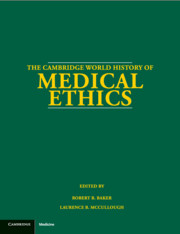Book contents
- Frontmatter
- PART I AN INTRODUCTION TO THE HISTORY OF MEDICAL ETHICS
- PART II A CHRONOLOGY OF MEDICAL ETHICS
- PART III DISCOURSES OF MEDICAL ETHICS THROUGH THE LIFE CYCLE
- PART IV THE DISCOURSES OF RELIGION ON MEDICAL ETHICS
- PART V THE DISCOURSES OF PHILOSOPHY ON MEDICAL ETHICS
- PART VI THE DISCOURSES OF PRACTITIONERS ON MEDICAL ETHICS
- PART VII THE DISCOURSES OF BIOETHICS
- PART VIII DISCOURSES ON MEDICAL ETHICS AND SOCIETY
- Appendix: Biographies: Who Was Who in the History of Medical Ethics
- Bibliography
- Index
PART II - A CHRONOLOGY OF MEDICAL ETHICS
Published online by Cambridge University Press: 28 May 2012
- Frontmatter
- PART I AN INTRODUCTION TO THE HISTORY OF MEDICAL ETHICS
- PART II A CHRONOLOGY OF MEDICAL ETHICS
- PART III DISCOURSES OF MEDICAL ETHICS THROUGH THE LIFE CYCLE
- PART IV THE DISCOURSES OF RELIGION ON MEDICAL ETHICS
- PART V THE DISCOURSES OF PHILOSOPHY ON MEDICAL ETHICS
- PART VI THE DISCOURSES OF PRACTITIONERS ON MEDICAL ETHICS
- PART VII THE DISCOURSES OF BIOETHICS
- PART VIII DISCOURSES ON MEDICAL ETHICS AND SOCIETY
- Appendix: Biographies: Who Was Who in the History of Medical Ethics
- Bibliography
- Index
Summary
Chronology is the backbone of history, the spine along which historical accounts are constructed. To structure the historical events, biographies, and publications discussed in the various chapters of this volume, and to set them in a global historical perspective, we have constructed a chronological timeline presented in four columns: Dates, Events, Persons, and Texts. The dates, events, persons, and texts cited in the chronology are, for the most part, those mentioned in this volume. Perusing the timeline should assist readers by offering a broad sense of comparative historical developments in their temporal relationship to each other.
Our format for the timeline was adopted from Werner Stein's Kulturfahrplan (Stein 1982). Our selection of medical events was influenced by the chronology of medical events listed in The Cambridge Illustrated History of Medicine (Porter 1996). As should be evident from the outset this chronology, unlike Stein's or Porter's, does not attempt to chronicle every major historical event in the history of the world, or even of the world of medicine. It chronicles the history and historiography of medical ethics through the end of the twentieth century, using a few noteworthy events in world and medical history as chronological signposts. Following Porter, the chronology opens circa 4000 BCE: the dates of the earliest known urban centers. The first person mentioned is the Hebrew prophet, Moses, the second Kong Qiu, known in the West as Confucius.
- Type
- Chapter
- Information
- The Cambridge World History of Medical Ethics , pp. 21 - 98Publisher: Cambridge University PressPrint publication year: 2008



